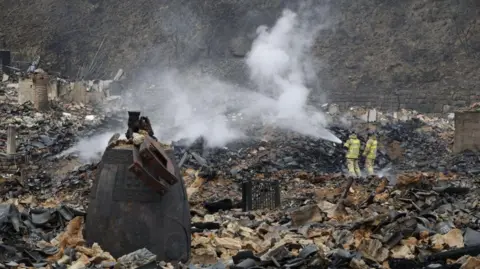South Korea's President Yoon Suk Yeol Removed from Office: The Implications Ahead











2025-04-04T08:57:59.000Z

In a momentous ruling, South Korea's Constitutional Court has unanimously voted to uphold the impeachment of President Yoon Suk Yeol, effectively removing him from office. This decision follows a tumultuous period that began when Yoon was suspended from his duties in December 2023 after a controversial attempt to impose martial law, which ignited widespread protests and public outcry.
The court's verdict was announced on a day filled with mixed emotions across the nation, as supporters and critics of Yoon gathered in various locations throughout Seoul to witness the ruling live. For many, the moment was cathartic, bringing tears of joy for those who had long opposed Yoon's administration and its perceived overreach of power. However, it also stirred feelings of sadness among his loyal supporters, who felt their leader was unjustly ousted.
Looking ahead, South Korea now faces a crucial juncture. A snap election must be organized to select Yoon's successor, to be held by June 3, 2024. This transition period is expected to be rife with tension and division, as the political landscape has been deeply altered in the wake of Yoon’s actions. The implications of his military takeover, although brief, have left scars on the nation's psyche, with many citizens incensed by the memories of a past marked by authoritarian rule. The night of December 3, 2023, when Yoon ordered troops to storm the National Assembly, has been likened to a historical alarm bell, signaling that martial law is not merely a relic of the past, but a potential reality should future leaders choose to follow a similar path.
The court's ruling was met with widespread approval, as it reaffirmed South Korea's commitment to democracy at a time when many feared for its future. The eight-member bench was unequivocal in its condemnation of Yoon’s actions. Moon Hyung-bae, the acting president of the court, stated that Yoon's attempt at a military coup was wholly unjustified and emphasized that his actions had severely undermined the fundamental rights of citizens. He articulated that Yoon had indeed acted against the very populace he was meant to protect, underscoring the severity of the breach of trust inherent in the president's conduct.
The Constitutional Court's ruling has sparked serious discussions regarding the need to amend South Korea’s constitution, with many advocating for reforms aimed at strengthening institutional checks on presidential power. While such changes could help prevent future abuses, they would require a politically courageous leader willing to relinquish a portion of their authority, a challenging prospect in the current polarized environment.
As Yoon exits the political scene, he leaves behind a country more divided than ever. Initially, there was a shared sense of disgust among South Koreans in the wake of his actions, but over time, Yoon has successfully framed himself as a martyr to his base, claiming that he was the target of an establishment dominated by perceived 'communist' influences. His assertions of election rigging and infiltration by foreign spies have resonated with a growing segment of the population, further exacerbating societal divisions.
Thousands continue to protest weekly in Seoul, voicing their grievances against what they view as a corrupt political system. The fallout from Yoon's presidency has led to a disturbing trend in public opinion; survey data indicates that more than a third of South Koreans no longer trust the Constitutional Court, and a significant portion expresses skepticism about the integrity of elections. With an election looming, these sentiments pose significant challenges for the next leader of South Korea, who will need to navigate a politically charged atmosphere.
Moreover, South Korea's economic landscape is also in jeopardy, particularly with the impending challenges posed by external pressures, notably from the United States under President Trump. His administration's tariffs on South Korean goods, especially cars and steel, have already inflicted economic damage, with fears that further pressures could emerge. Many anticipate a confrontation over defense costs and possible negotiations with North Korea, which could complicate the incoming administration's position.
Yoon's legal team has criticized the court's decision, claiming it was politically motivated. One of his lawyers, Yoon Gap-geun, expressed regret over the ruling, suggesting that the entire trial process was not conducted lawfully. Despite these claims, calls for national unity resonate among many politicians, urging citizens to accept the court's verdict to pave the way for a more stable future.
In his farewell statement, Yoon offered an apology to his supporters, acknowledging his shortcomings but failing to address the court's ruling directly. He expressed gratitude for those who stood by him, affirming that serving as president has been a significant honor. While he cannot appeal the ruling, his political future may remain contentious, as he has previously vowed to contest his ousting until the end.
South Korea now stands at a critical crossroads, faced with the task of healing a fractured society and electing a new leader capable of unifying the country and fostering a stronger democratic ethos.
 Maria Kostova
Maria Kostova
Source of the news: www.bbc.com